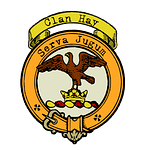Welcome back to "A Clan A Day Podcast," brought to you by bagtownclans.com. I’m your host, Colin MacDonald, and today, we’re diving into the rich history of Clan Chisholm, a Highland family whose origins may stir up some debate, but whose contributions to Scottish history are undeniable.
The Chisholms, or Siosal in Gaelic, claim to be of Celtic origin, though the story of their rise suggests a Lowland and possibly Norman beginning. Tradition and early records indicate that the Chisholms may have originated from the Scottish Borders, in Roxburghshire. The name “Chisholm” is said to have developed from the combination of a Norman term “de Chese” and the Saxon “Holme,” linking them with both Norman and Anglo-Saxon roots. Despite these Lowland origins, the clan fiercely embraced their Highland identity, eventually becoming one of the key families in the Highlands of Scotland.
The Chisholms gained prominence in the 14th century when Sir Robert de Chisholm married into the influential Lauder family. This marriage not only tied the Chisholms to the governance of the strategic Urquhart Castle on Loch Ness, but it also began their transition into the north. Robert de Chisholm held significant power as Justiciar north of the Forth, making the family one of the most important in the Highlands during this period.
By the early 15th century, the Chisholms had firmly established themselves in the Highlands, acquiring the lands of Comar and Strathglass. These lands became the heart of the Chisholm influence, centered around Erchless Castle, their stronghold. The family’s Gaelic identity grew stronger, and their Highland possessions solidified their claim as a true Highland clan.
Like many Highland clans, the Chisholms were deeply involved in the tumultuous politics of Scotland. During the Wars of Independence, they sided with Robert the Bruce, with Sir John de Chisholm reportedly fighting at the Battle of Bannockburn in 1314. In the centuries that followed, the Chisholms became known for their loyalty to the Stuart cause, aligning themselves with the Jacobites in their uprisings against British rule.
In the Jacobite Risings, the Chisholms played a significant role. During the 1715 rising, the clan supported the Earl of Mar, with Chisholm of Cnocfin leading the clan’s men at the Battle of Sheriffmuir. Though this rebellion ended in defeat, the Chisholms remained staunch supporters of the Jacobite cause. In the 1745 rebellion, the Chisholms again answered the call. This time, they were led by Roderick Og Chisholm, who brought the clan’s small force to fight at the Battle of Culloden. Tragically, many Chisholms were killed during the battle, including Roderick Og himself. Culloden marked the end of the Jacobite dream, but the Chisholms’ loyalty to the Stuart cause left a lasting legacy.
One of the most fascinating episodes in Chisholm history occurred after the defeat at Culloden. Prince Charles Edward Stuart, the "Bonnie Prince," was on the run, hiding from British forces. In one of his most famous escapes, he was aided by the Seven Men of Glen Moriston, three of whom were Chisholms—Alexander, Donald, and Hugh. These men had sworn to protect the Prince, risking their lives to shelter him in the Highlands. Their loyalty, even in the face of overwhelming danger, exemplifies the enduring spirit of Clan Chisholm.
Though the clan faced many challenges, including the forfeiture of their lands after their Jacobite sympathies, they managed to regain their estates and continue as a powerful family in the Highlands. The Chisholm chiefs held onto their lands well into the 19th century, and their ancestral seat, Erchless Castle, remains one of the most picturesque castles in Scotland.
Beyond their military and political endeavors, the Chisholms also made their mark in religious and academic spheres. The Chisholms produced several important bishops during the Reformation, particularly the Chisholms of Cromlix in Perthshire. The family’s connection to the Church of Scotland and their influence within the Catholic Church further solidified their role in Scottish history.
One of the more colorful aspects of Clan Chisholm history is their chieftains’ use of the title "The Chisholm." It is said that one proud chief declared that only three people in the world could properly be called “The”: the Pope, the King, and the Chisholm. This bold assertion reflects the pride and status the Chisholms held, not just in the Highlands, but in the greater fabric of Scottish nobility.
Today, the Clan Chisholm Society works to preserve the rich history and heritage of this remarkable family. From their possible Norman roots to their transformation into a Highland powerhouse, the Chisholms have left an indelible mark on Scotland. Whether through their support of the Jacobite cause, their religious leadership, or their contributions to the culture of the Highlands, the Chisholms’ story is one of resilience, loyalty, and pride.
Thank you for joining us on this journey through the history of Clan Chisholm. Be sure to tune in tomorrow for another episode of "A Clan A Day Podcast." I’m Colin MacDonald, and as always, Go n-éirí an bóthar leat!











